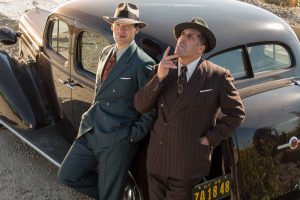![]()
The latest feature from filmmaker Woody Allen, Café Society, is a curious one. This period piece set in the 30s may not rank among my personal favorites from the director, but it retains some intriguing aspects that help conceal its occasional miscues. Viewers just need to know ahead of time that is a lot more wistful, pensive and contemplative than they will be expecting.
 Bobby is a young man yearning to get out of Manhattan; he dreams of starting a new life out in Hollywood, California. Upon arriving, the protagonist finds himself out of his element, struggling for work. Luckily, his blunt uncle Phil (Steve Carell) agrees to let Bobby do odd jobs for a talent agency he runs. While it’s hardly glamorous work, the young man does befriend secretary Vonnie (Kristen Stewart) and ends up falling hard for her. The lady already has a mysterious, unseen beau, but the chemistry is strong enough for Bobby to continue his pursuits over a lengthy period of time.
Bobby is a young man yearning to get out of Manhattan; he dreams of starting a new life out in Hollywood, California. Upon arriving, the protagonist finds himself out of his element, struggling for work. Luckily, his blunt uncle Phil (Steve Carell) agrees to let Bobby do odd jobs for a talent agency he runs. While it’s hardly glamorous work, the young man does befriend secretary Vonnie (Kristen Stewart) and ends up falling hard for her. The lady already has a mysterious, unseen beau, but the chemistry is strong enough for Bobby to continue his pursuits over a lengthy period of time.
As expected, Eisenberg makes an excellent surrogate for director Allen, emulating many of the filmmaker’s tics and delivering his anxieties with amusing efficiency. The character’s relationship with Vonnie makes up the heart and soul of the movie and the two performer’s familiarity with one another (they’ve teamed up onscreen many times in the past) adds an authentic sense of spark and compatibility between the two.
 Unexpectedly, one would have anticipated a bit more sharpness from the digs about the egotistical Hollywood elite. There are plenty of jokes about the excesses of celebrity and Carell earns a few chuckles as the agent, but many of the barbs aren’t nearly as biting as they could be. At least a handful of jokes do work well; it’s just that they’re based around the Bronx-based family of the protagonist and not the showbiz world.
Unexpectedly, one would have anticipated a bit more sharpness from the digs about the egotistical Hollywood elite. There are plenty of jokes about the excesses of celebrity and Carell earns a few chuckles as the agent, but many of the barbs aren’t nearly as biting as they could be. At least a handful of jokes do work well; it’s just that they’re based around the Bronx-based family of the protagonist and not the showbiz world.
Much of the more effective examples of humor come from Bobby’s gangster brother (Corey Stoll), who violent actions appear to suggest that there’s a body in the cement somewhere underneath every New York structure. There’s also some funny comments when the same character suddenly converts from Judaism to Christianity, which comes as more of a shock to his family members than numerous murder charges.
 The period cinematography of Oscar winner Vittorio Storaro (Apocalypse Now, Reds, The Last Emperor) is gorgeous and vibrant. There’s a eye-catching yellow glow to the film. The gauziness and haze on display in the frame accurately reflects themes of attempting to live out your dreams from the characters. Even while the movie grapples here and there (sometimes unnecessarily) to find humor, it always looks beautiful.
The period cinematography of Oscar winner Vittorio Storaro (Apocalypse Now, Reds, The Last Emperor) is gorgeous and vibrant. There’s a eye-catching yellow glow to the film. The gauziness and haze on display in the frame accurately reflects themes of attempting to live out your dreams from the characters. Even while the movie grapples here and there (sometimes unnecessarily) to find humor, it always looks beautiful.
In this film a character states something along the lines of, “A life unexamined is not worth living, but a life examined is no bargain either.” Between the banter, there’s a lot of longing and melancholy on display. Characters struggle with choices that impact their personal lives in major ways, always wondering what the other decision might have fashioned. It’s the most interesting facet of the movie and one that even more emphasis could have been placed.
Although it’s very different, one can’t help but see a sort of connection between this movie and a specific romance movie from filmmaker David Lean; both, at least to some degree, examine several of the same themes. Café Society shifts around tonally and doesn’t always hit the right note, but it’s still effective enough to give a minor recommendation to fans of the director.


